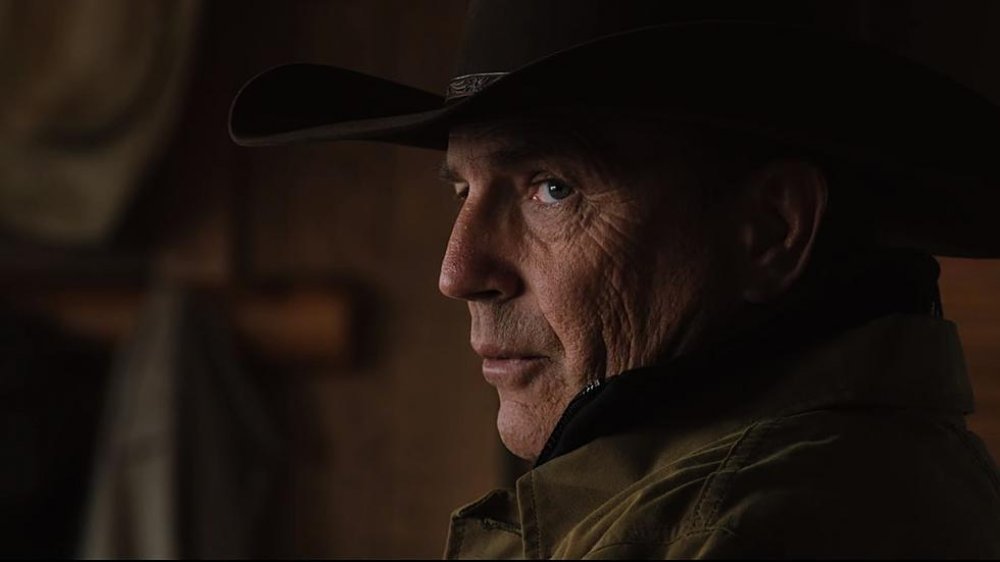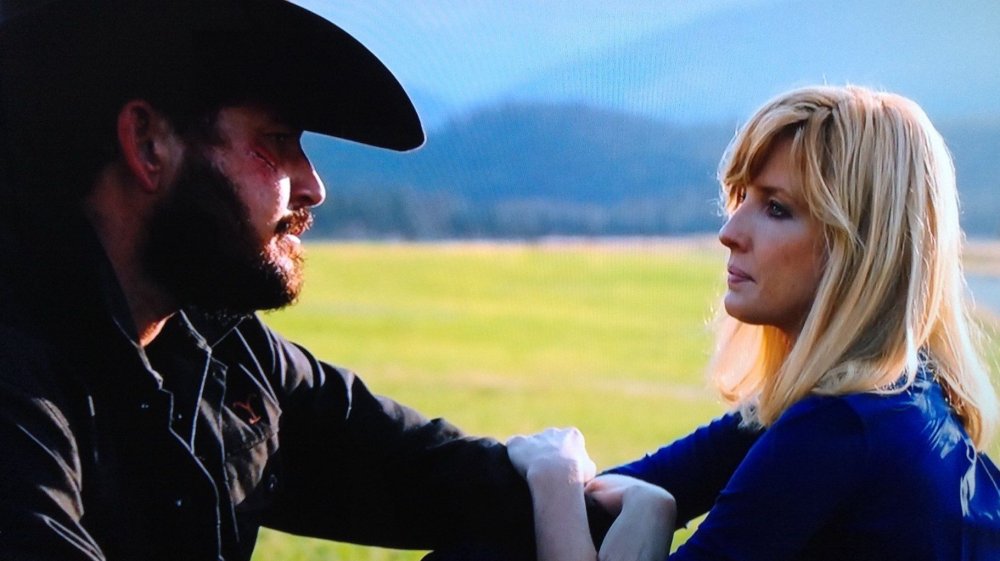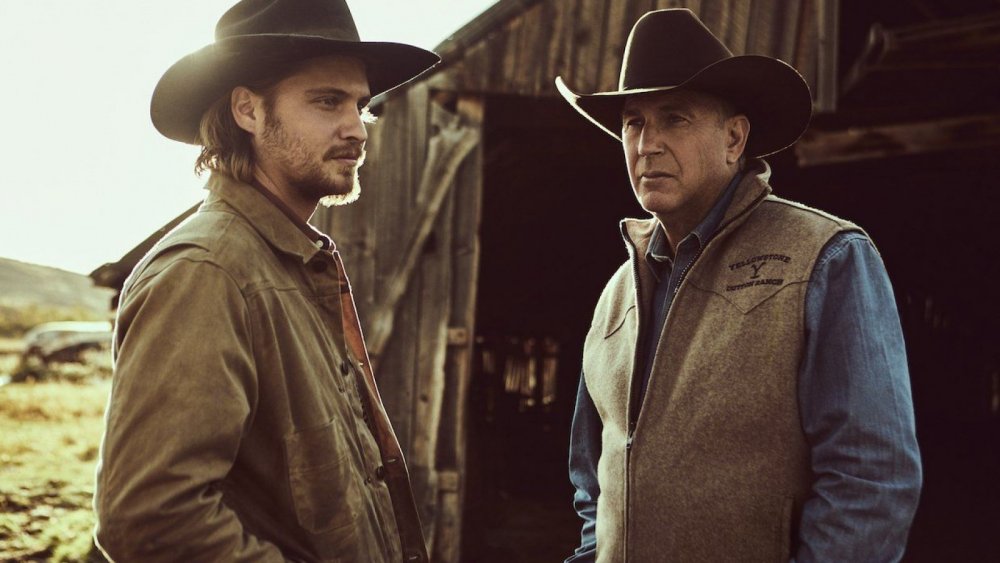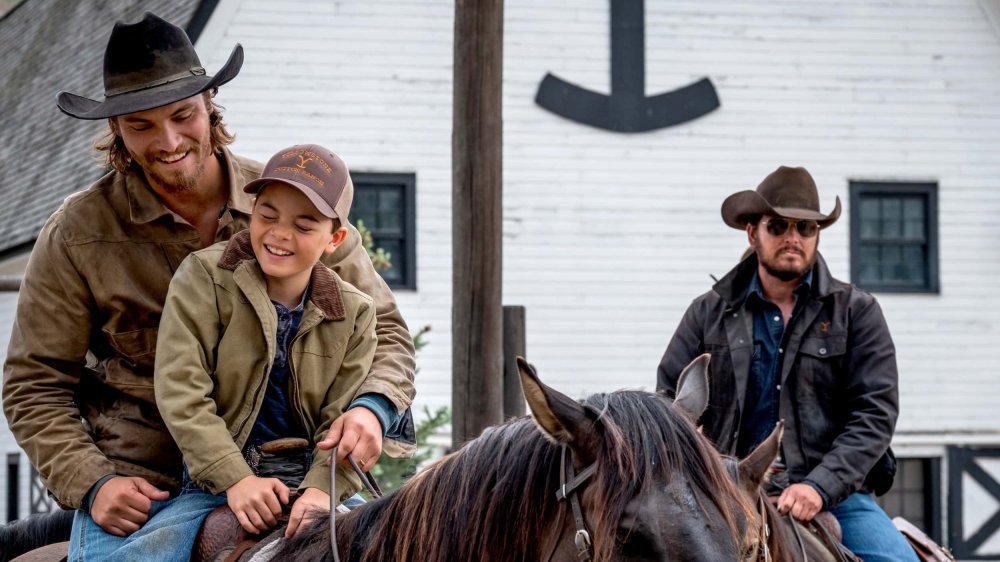What The Wolves On Yellowstone Really Mean
Contains spoilers for Yellowstone season 3, episode 2
Paramount Network's Yellowstone tells the story of Montana land owner John Dutton (Kevin Costner) and his dynastic family ranch. "Family" is perhaps a bit of a misnomer in this instance, since Dutton and his personal land trust control over half a million acres of western wilderness in the area surrounding Bozeman. From the very first moments of Yellowstone, the Duttons are beset on all sides. In order to preserve his legacy, John has to fend off greedy, carpetbagging luxury developers attempting to build a subdivision abutting his land, a vengeful chairman on the local reservation hell-bent on restoring his tribal lands, and turncoat politicians who smell blood in the water and may be looking to put John out to pasture. It all adds up to a pretty dramatic brew.
The Yellowstone Dutton Ranch is populated by a heady mix of day laborers, branded men and John's own spoiled children, who are as much a threat to the legacy they stand to inherit as any billionaire developer or crooked governor. It's also populated by quite a bit of wildlife, and on a show like Yellowstone, the natural world is always one of the most important characters.
From the very first establishing shot of Montana's wild grandeur, Yellowstone gives you the sense that this will be a story about the land as much as the people who inhabit it. To that end, every rapid river and dangerous cliff — every wandering bear and marauding pack of wolves — serves a narrative purpose. Since season 1, those wolves in particular have carried substantial thematic weight.
John Dutton hopes to keep the wolves in the hills on Yellowstone
The wolves of Yellowstone have always served as a pretty potent visual metaphor on the show. They first arrived on the scene to provide the main attraction for Beth (Kelly Reilly) and Rip's (Cole Hauser) morbid date night in season 1. After rebuffing Rip's invitation to attend a music festival, Beth agrees to get drunk and watch wolves tear apart a carcass. The romantic evening's all going as planned, until Beth takes a deep pull of her whiskey bottle and jumps out of the car to run screaming at the wolves. Rip grabs his gun and barrels after her, but she manages to make enough of a scene to scare all the wolves away. As it turns out, this was much more than just a weird scene to demonstrate Beth's reckless depravity.
The wolves represent all the external predators circling the Yellowstone Ranch, just waiting to tear apart the carcass of John Dutton's considerable estate. If this symbolism was ever in doubt, it's essentially confirmed on an episode later in the season wherein we cut away to an otherwise inconsequential scene of opportunistic wolves pulling apart a bear carcass on the outskirts of John's land. The pack picks the bear clean to the bone, an unsubtle message about what's poised to happen to John's ranch when he dies. Beth, a ruthless vulture capitalist at her day job with a Salt Lake City private equity firm, has been summoned back to the ranch to apply her vicious skill-set against John's enemies. Her fearless charge at the wolves suggests that she certainly has the guts to pull it off, but is her particular brand of scorched-earth corporate warfare really the right solution for the Yellowstone?
The wolves suggest that Kayce may be his father's best hope on Yellowstone
In season 3, the wolves are back and even more loaded with meaning. On episode 2, entitled "Freight Trains and Monsters," one lupine voyeur creeps up on a private moment between Kayce (Luke Grimes) and Monica (Kelsey Asbille). Monica is obviously startled by the interloper, but Kayce reassures her that the wolf just wants to watch. They continue with their tryst in front of the wolf, and everybody seems copacetic with this arrangement. Later, Kayce has a straight-up conversation with a wolf, offering to cut a deal so that the wolves can have free run of the wildlife on the Yellowstone just as long as they stay away from the horses and domesticated cattle. Assuming this wolf speaks for the pack, it seems like they reach a meeting of the minds.
Once a metaphor has been established, a writer can use it to foreshadow, and that seems to be what's going on here. We're now in season 3, with the literary weight of the wolves well-ingrained in the show's DNA. With all that in mind, Kayce's special relationship — and apparent detente — with the feral predators tells us a lot about where we might be headed. Is it possible that Kayce, the prodigal son, might be the only Dutton with the skills and the temperament to stave off the scavengers and preserve the Yellowstone legacy after the patriarch is gone? It certainly fits with everything we've seen so far, and even considering all of Kayce's baggage, he still seems better suited to the task than any of his siblings. Beth might be able to temporarily scare away a pack, but Kayce's the only one who can negotiate a stable, enduring peace.
Kayce has been marked as the Yellowstone's savior from the beginning
Careful viewers will no doubt note that Kayce has been set up as the great family hope since way back in season 1. Remember, the Duttons' problems are threefold: First, they have to keep the circling corporate developers at bay. Season 1 antagonist Dan Jenkins (Danny Huston) was the first real estate predator, but he wasn't the last. Season 3 introduced Roarke Morris (Josh Holloway) into John Dutton's fraught equation, and he seems to have big plans for the idyllic valley that the Yellowstone occupies. Second, the old boy's club that used to hold the reins of power in Montana politics has largely crumbled, and John now finds himself less able to grease the wheels of government for his own corrupt benefit. Third, the neighboring reservation still has their collective eyes trained on Dutton's land, and their generational blood feud with the American settlers that stole their land runs deep.
Even if Kayce and his siblings can deal with the first two threats, the third remains problematic. The Dutton chain of succession may, counter-intuitively, hold the key to settling matters with Rainwater's tribe. Kayce's only son and likely heir, Tate Dutton (Brecken Merrill), is half American Indian, and grew up on Rainwater's reservation. In season 1, Chairman Rainwater even remarks to Kayce that his son doesn't look like his white father, the intimation being that he belongs to and with the tribe. Even if Kayce doesn't ultimately solve all of the Yellowstone's problems in his lifetime, his son could grow into an able peacemaker if he inherits the estate through his father. If Tate Dutton owns the Yellowstone Ranch, then in a very literal way the land will have been restored to tribal stewardship. That might just be enough for Rainwater. We'll just have to keep watching to see if Kayce can get out of his own way long enough to make this possible future a reality.
New episodes of Yellowstone air Sundays on Paramount Network at 9 PM Eastern.



